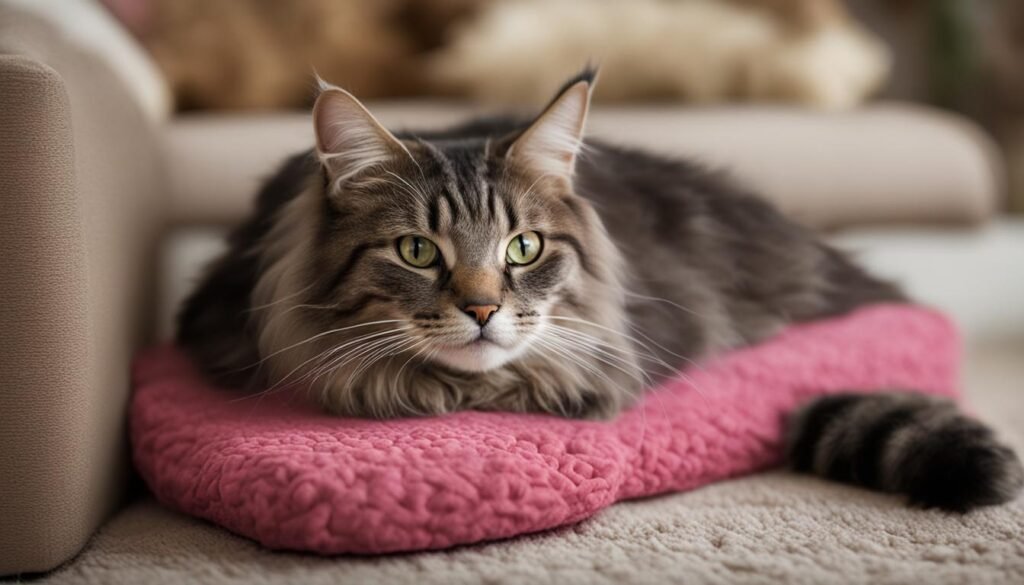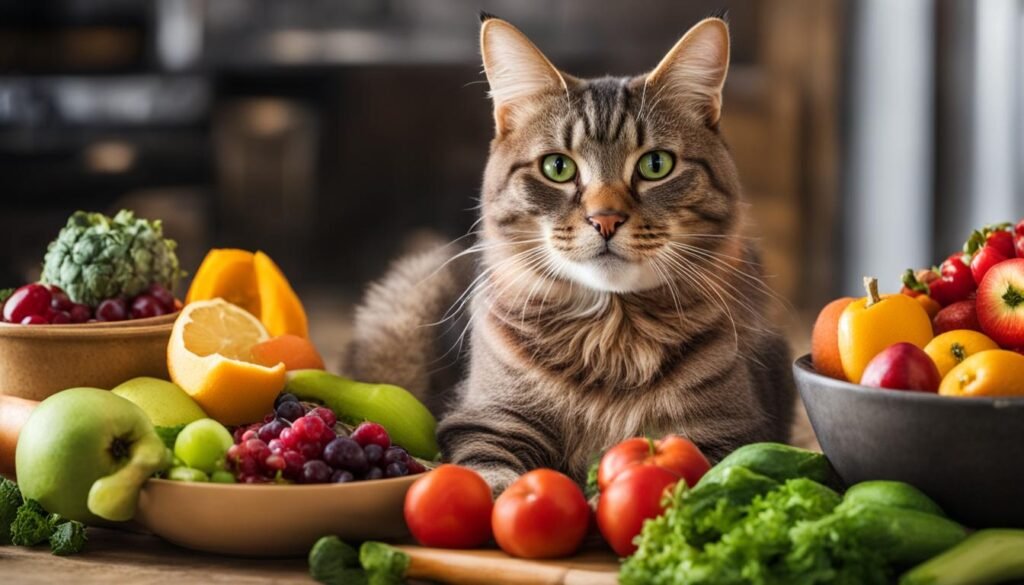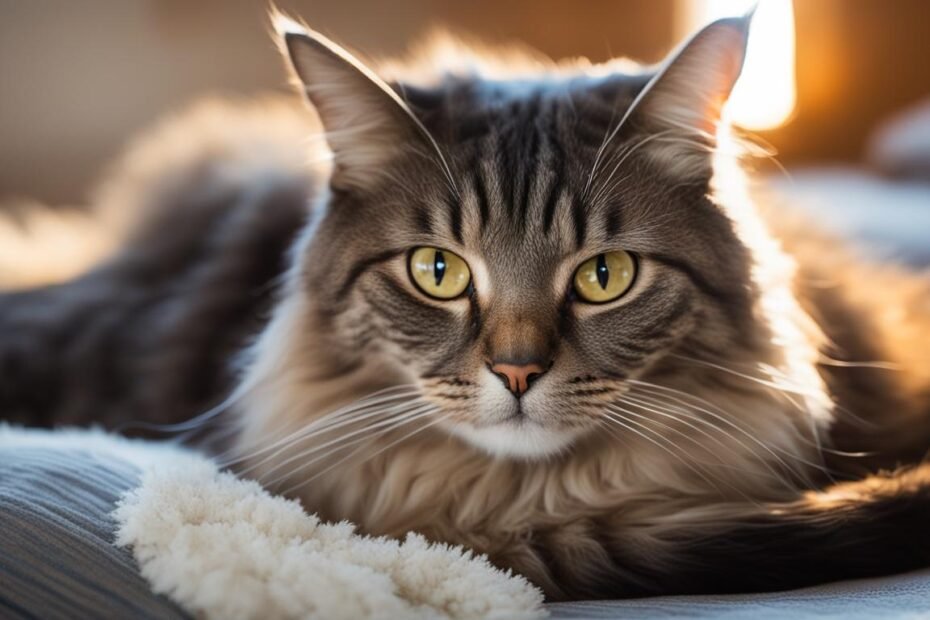Senior cats require special care and attention to maintain their health and well-being. As our feline friends age, they may face unique challenges that require a tailored approach to their healthcare. In this section, we will explore important considerations for senior cat health, including geriatric cat care and common health issues in older cats. By implementing these key tips and advice, you can ensure that your senior cat enjoys a happy and healthy life.
Key Takeaways:
- Senior cats have specific health considerations that require specialized care.
- Keeping senior cats indoors protects them from various dangers and provides a safer environment.
- Proper nutrition is crucial for maintaining senior cat health, including choosing high-quality pet food and regulating their diet.
- Regular veterinary checkups are essential for early detection and management of common health issues in older cats.
- Prioritizing early detection and proper care is key to maintaining optimal senior cat health.
The Importance of Indoor Living for Senior Cats
Indoor living is crucial for the health and safety of senior cats. Unlike outdoor cats, indoor cats are protected from various dangers, including disease, car accidents, and encounters with wild animals. By keeping your senior cat indoors, you provide them with a secure and controlled environment where they can thrive.
But indoor living doesn’t mean limiting your cat’s experiences. It is essential to create a stimulating and enriching environment for your indoor senior cat. Provide them with toys that encourage physical activity and mental stimulation. Consider incorporating vertical spaces, such as cat trees and shelves, to satisfy their natural instinct to climb and explore.
“Indoor living is a safe and rewarding choice for senior cats. It allows them to live longer, healthier lives while still enjoying a stimulating and enriching environment.” – Dr. Emily Jones, Veterinarian
Additionally, make sure to establish a routine that includes regular playtime and bonding sessions with your senior cat. This helps maintain their physical health, mental well-being, and strengthens the bond between you and your feline companion.
| Benefits of Indoor Living for Senior Cats | Stimulating and Enriching Environment |
|---|---|
| Protection from disease, car accidents, and wild animals | Provide toys for physical and mental stimulation |
| Reduced risk of injuries and trauma | Offer vertical spaces for climbing and exploring |
| Increased lifespan | Establish a routine for playtime and bonding |
In conclusion, keeping your senior cat indoors is vital for their well-being and longevity. Create a stimulating and enriching environment that will satisfy their natural instincts and provide a safe haven away from potential hazards. By doing so, you can ensure that your beloved feline companion enjoys a healthy, happy, and fulfilling life.

Proper Nutrition for Senior Cats
Proper nutrition plays a crucial role in maintaining the health and well-being of senior cats. As cats age, their dietary needs change, and it is important for pet owners to educate themselves on proper kitty nutrition to ensure their furry companions receive the necessary nutrients for optimal health. Here are some key considerations when it comes to feeding senior cats:
Dietary Recommendations and Pet Food Selection
- Choose a high-quality pet food that includes meat protein as the first ingredient. This ensures that your senior cat receives essential amino acids that support muscle maintenance and overall health.
- Consider grain-free options, as they are often easier for cats to digest and can help prevent sensitivities or allergies.
- If your cat has specific dietary needs or health conditions, consult with your veterinarian for personalized recommendations.
Regulating Diet and Meal Times
Free-feeding, or leaving food out all day, may not be ideal for senior cats. It can lead to overeating and weight gain, which can contribute to various health issues. Instead, consider regulating your cat’s diet by offering measured portions of food at specific meal times. This helps prevent obesity and allows you to monitor their intake more effectively.
Fresh Water Availability
Senior cats tend to have a lower thirst drive, so it is crucial to provide fresh water at all times. Ensure that the water bowl is clean and easily accessible. Additionally, consider providing multiple water sources throughout your home to encourage hydration.
Preventing Urinary Tract Diseases
Proper nutrition plays a significant role in preventing urinary tract diseases in senior cats. Ensuring a balanced diet that meets your cat’s nutritional needs can help promote urinary tract health and prevent issues such as urinary crystals or stones. Additionally, providing fresh water and regularly cleaning the litter box can further support your cat’s urinary health.
By prioritizing proper nutrition and implementing these strategies, you can help maintain your senior cat’s overall health and well-being.
| Nutrition Tips for Senior Cats | Benefits |
|---|---|
| Choose high-quality pet food with meat protein as the first ingredient | Provides essential amino acids for muscle maintenance |
| Consider grain-free options | Easier to digest and may prevent sensitivities or allergies |
| Regulate your cat’s diet and offer measured portions | Prevents overeating and helps with weight management |
| Provide fresh water at all times | Prevents dehydration and supports overall health |
| Ensure a balanced diet to prevent urinary tract diseases | Promotes urinary health and prevents issues like crystals or stones |

Common Health Issues in Senior Cats and How to Manage Them
Senior cats are more susceptible to certain health issues, including kidney disease. Understanding the signs, stages, causes, and risk factors of kidney disease can help you effectively manage your feline companion’s health. Regular vet checkups are essential for early detection and intervention.
Signs and Stages of Kidney Disease
Kidney disease in cats progresses slowly and can be categorized into different stages. Early signs of kidney disease may include increased thirst and urination, weight loss, poor appetite, and lethargy. As the disease progresses, additional symptoms such as vomiting, dehydration, and changes in urinary habits may occur. It is important to be vigilant and seek veterinary care if you notice any of these signs.
Common Causes and Risk Factors
There are several factors that can contribute to the development of kidney disease in senior cats. Common causes include old age, genetic predisposition, infections, toxins, dental disease, and obesity. It’s important to provide a healthy and balanced diet, maintain dental hygiene, and prevent exposure to harmful substances to reduce the risk of kidney disease.
Recommended Diet and Nutrition
Diet plays a crucial role in managing kidney disease in cats. Your veterinarian may recommend a special diet that is low in phosphorus and protein to ease the workload on the kidneys and minimize the progression of the disease. Prescription diets formulated specifically for cats with kidney disease are available and can help support their overall health. It’s important to follow your veterinarian’s recommendations and monitor your cat’s response to the diet.
Supplements and Medications
In addition to dietary modifications, your veterinarian may prescribe supplements and medications to help support your cat’s kidney function. These may include potassium supplements, omega-3 fatty acids, and medications to control blood pressure. It’s important to administer these treatments as directed and keep track of any improvements or changes in your cat’s condition.
At-Home Care and Monitoring
Proper at-home care and monitoring are crucial for managing kidney disease in senior cats. This includes providing fresh water at all times, encouraging regular exercise, and administering medications as prescribed. Regular checkups with your veterinarian are important to monitor your cat’s kidney function and overall health. It’s also essential to maintain good dental hygiene through regular brushing and professional cleanings, as dental disease can contribute to kidney problems.
| Treatment | Description |
|---|---|
| Dietary modification | Low phosphorus and protein diet to ease kidney workload |
| Supplements | Potassium supplements and omega-3 fatty acids for kidney support |
| Medications | Control blood pressure and manage symptoms |
| Regular checkups | Monitor kidney function and overall health |
| Good dental hygiene | Regular brushing and professional cleanings to prevent dental disease |
By staying informed about the common health issues in senior cats, such as kidney disease, and taking proactive measures to manage their health, you can provide your furry friend with the best possible care. Remember to consult with your veterinarian for personalized advice and recommendations tailored to your cat’s specific needs.
Conclusion
Taking care of your senior cat’s health is a responsibility that requires consistent effort and attention. By prioritizing early detection and care, you can maintain good senior cat health and provide them with a long and happy life.
One key aspect of maintaining good senior cat health is regular vet checkups. These checkups allow for early detection and treatment of potential health issues, ensuring that your cat receives the appropriate care and support.
Additionally, proper nutrition plays a vital role in senior cat health. Choosing high-quality pet food, regulating your cat’s diet, and providing fresh water are essential steps in promoting their overall well-being and preventing common health concerns such as urinary tract diseases.
Remember to also prioritize exercise and mental stimulation for your senior cat. Keeping them physically active and mentally engaged helps maintain their cognitive function and prevents boredom or behavioral issues.
FAQ
What are some key tips for maintaining senior cat health?
Some key tips for maintaining senior cat health include keeping your cat indoors, providing a stimulating environment, educating yourself on proper nutrition, keeping their water fresh, and scheduling annual checkups with your veterinarian.
Why is it important to keep senior cats indoors?
Senior cats should be kept indoors to protect them from dangers such as disease, car accidents, and wild animals. Indoor cats generally live longer lives than outdoor cats.
How can I provide a stimulating environment for my indoor senior cat?
To provide a stimulating environment for your indoor senior cat, you can provide toys, beds, and vertical space for climbing and exploring. This helps keep them mentally and physically engaged.
What should I consider when choosing pet food for my senior cat?
It is important to educate yourself on proper kitty nutrition and choose high-quality pet food that includes meat protein as the first ingredient. Grain-free options are ideal if possible. Avoid free-feeding and regulate your cat’s diet with twice a day mealtimes.
Why is fresh water important for senior cats?
Fresh water should always be available for senior cats, as they tend to have a low thirst drive. Proper hydration helps prevent urinary tract diseases and other health issues.
What are common health issues in senior cats and how can they be managed?
Senior cats are prone to certain health issues, including kidney disease. Regular vet checkups are essential for early detection and management. Adjusting your cat’s diet, providing supplements, and medications can help support kidney function. At-home care and monitoring, including regular vet checkups, weigh-ins, and dental care, are crucial for managing senior cat health.
What is the key to maintaining good senior cat health?
Prioritizing early detection and proper care is key to maintaining optimal senior cat health. By following the tips and advice provided, including proper nutrition, regular vet checkups, exercise, and mental stimulation, you can ensure that your senior cat enjoys a long, healthy, and happy life.
